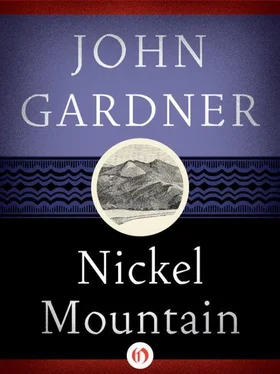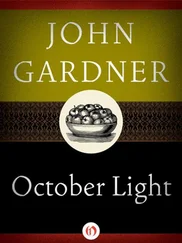“He’s killed, isn’t he?” Jimmy said.
Henry nodded.
“Are you going to shoot him again?” Now a hint of distaste did come, but mainly the boy was curious.
“No point in shooting things after they’re dead,” Henry said.
The boy continued to move his hand very gently on the fur, his question not fully answered, Henry knew, because really it had nothing to do with shooting: a question about what death was, how a thing so unreasonable could be tamed, made to fit in a world of waterbugs, trees, mountains, customers at the restaurant. He said, “Why?”
“A thing can only die once,” Henry said. “Things live and then they die.”
He looked past the boy at the pine woods that began some fifty feet up the slope from where they stood, beyond where the Riddle place used to stand before it burned. It was utterly still in there and dark as a church. Needles on the ground kept out all growth, and wherever one entered, long, gloomy aisles radiated out straight and clean. The CCC boys had planted the trees in 1935 or so. He could remember coming here with his father to watch them work. The Riddles’ place had been gone even then. His father would sit on a rock biting the sweet white tips off timothy shoots and he would chirp at sparrows or meadowlarks as though he were one of them and fond of gossip. Henry had come here two, three times when he’d first found out he was going to die. Self-consciously, sentimentally (as he’d come to see), he would slip into his father’s poses: He would lean his gun against a stump and lower his great, loose body down beside the gun, plant his elbows on his knees, tip his cap back and stare in at the gloomy aisles that led away to the darkness farther in. But he’d gone on living, taking his pills when he needed them, and gradually he’d gotten used to it, and it had come to him that it wasn’t the same. The gloomy aisles weren’t there yet when his father had come, it was spindly new trees he’d looked at, and blowing grasses and birds. If he looked he could see the cemetery, across from here, the narrow gray stones in the shade of the maples and beeches there, but it wasn’t that that had drawn his attention. If he ever looked there, he saw it with the same calm, like a man who’d been married to all that for fifty years. Though Henry couldn’t have predicted it — you had to get to that point yourself to know that somebody else had been there — he saw now that that was inevitable. Everything passes, the carved-out rocks by the brook proved it, and the excitement of fear was no more enduring than anything else. A bad heart was the beginning of wisdom.
“Look at his eyes,” Jimmy said.
He nodded.
“They sort of squint, don’t they? Why do they squint?”
“Because he’s dead,” he said.
(Callie’s mother had said, “What do you get out of it, shooting defenseless rabbits?”
He’d shrugged, and Callie had said, “Now, Mother, don’t you go butting into Henry’s business.”
“It keeps him from shooting Baptists,” Callie’s father had said. “He, he, he!” And Henry had said, a little righteously, as it seemed to him later, “I don’t want to shoot Baptists. It’s not that at all.”
“Well, then you’re a goddamn fool,” Callie’s father had said. He kept beer in the refrigerator, purely as an affront to her, and he could swear like a trooper. He was her cross, she said. But he’d prayed, the time Jimmy had gone into convulsions, and Henry had understood it, whether Callie could or not. There’d been nothing they could do, once they got him to the hospital. Jimmy had been not quite two. At first he’d had a crazy look in his eyes, a clouded look, like the look of an animal dying. Henry had reached into the crib for him, Callie’s father looking over his shoulder (it was up at their place it had happened), and there’d been that look in Jimmy’s eyes, his face white in the dark room, and Jimmy had drawn back in terror, not knowing his own father; and then when Henry had him in his arms, Jimmy’s eyes had rolled up and he’d gone stiff all over, and Callie’s father had said “Holy God!” and on the way to the hospital he’d started to pray, with Callie’s mother sitting stiff as a board beside him, holding the baby, keeping his teeth apart with her bare fingers, and Callie was glaring through the windshield like a madwoman, almost more furious at her father than scared for Jimmy — and that too was natural, it seemed to Henry, even good; yes. He’d driven like hell was after them and it was a wonder they’d any of them made it.)
But now the boy had lost all interest in the rabbit, and Henry thought, Well, all right, then; everything in its time. He dropped the rabbit in the bag.
The boy said, “What are they doing over there?”
Henry looked over where the boy was pointing. There was a car parked in back of the truck now, and a woman stood watching the grave-diggers. They were strangers, city people from their looks. The man had on a suit and hat, and the woman had on a gray coat and a hat with flowers in it. Both of them were old.
“They’re digging a grave,” Henry said, taking off his cap again, as if absentmindedly.
“No they’re not,” Jimmy said, “they’re digging somebody up.”
“Mmm,” Henry said. Hardly noticing, he pulled up Jimmy’s trousers and tightened the belt. After a minute he took the boy’s hand and they started down.
“There’s four of them,” Jimmy said. “One, two, three, four.”
“Mmm,” Henry said. He stopped a minute to rest, then began again.
The world had changed for Henry Soames because little by little he had come to see it less as a yarn told after dinner, with all the relatives sitting around, and more as a kind of church service — communion, say, or a wedding. The change had in a way begun when they’d built The Maples. He’d felt a kind of awe, watching the place go up: not only awe at the looks of it (a gabled building like an old-fashioned Catskills barn, twice the size of Henry’s old diner, with planter-boxes inside and out, and twelve tables, and a fireplace at one end), but awe, too, at what his wife had done to him, scooping up his old life like wet clay and making it over into her own image, and awe at how easily she managed it all and how easily, even gladly, he had accepted it, in the end. It was as if it was something he’d been thinking all along and had never quite dared — though God knew it wasn’t. Her ideas had given him the willies, set in his ways as he’d been by then, and they’d probably have given him the willies even if she’d caught him younger; but he’d found there was no stopping her: She was hard as nails and mean as her mother when there was something she had to have. So he’d given in, and when he’d done it, not just in words but totally, freely choosing what he couldn’t prevent, he’d felt a sudden joy, as though the room had grown wider all at once (which by that time as a matter of fact it had), or as if he’d finally shoved in the clutch on the way down a long straight hill it was no use resisting. He’d stood out by the road with Jimmy, watching the carpenters work and after that the nurserymen and the painters (all this a year ago now), and he’d given up all thought of the mortgage and whether the truckers would still pull in, and he’d mused like a man only half-awake on how it had all come about, the long train of trivial accidents, affirmed one by one, that made a man’s life what it happened to become. It was a good life, he had to admit it, now that he could look at it, with nothing to do from morning to night but keep an eye on little Jimmy and from time to time catch up their books. (Callie was no good at the bookkeeping. The figures had a will as stubborn as her own: Twos, fours, sixes were as intransigently twos, fours, and sixes as stones were stones. She could no more juggle the bills than juggle dead tamaracks, and she would cry, and Henry would take over, and he’d have it all straightened out — as well as it could be — in no time.) He’d grown mystical, or, as Callie said, odd. He had no words for his thoughts; the very separateness of words was contrary to what he seemed to know. It began, perhaps, with his thought of what marrying Callie had done to him; if she’d made him into her own image it was nevertheless her own image discovered — for the first time to her as well as to him — in him: Henry Soames as he might, through her, become. Once he had fairly tested it, he knew beyond any shadow of doubt that the new life she had shaped was his own, it fit him the way his father’s old coat had one day, to his surprise, fit him, and from that moment on he didn’t just wear the new life, he owned it. He felt like a man who’d been born again, made into something entirely new, and the idea that such a thing could happen had startled him, and he’d seized on it, turning it over and over in his mind the way you turn over a hundred-dollar bill. But the new life he’d found in himself had no settled meaning yet: It was all a-shimmer and vague, like a dream. It lacked the solid reality that would come when he’d lived it long enough to know it had something in common with the old — long tedious hours in the middle of winter when no one came in, days when Callie was short-tempered and Jimmy had a devil in him.
Читать дальше











